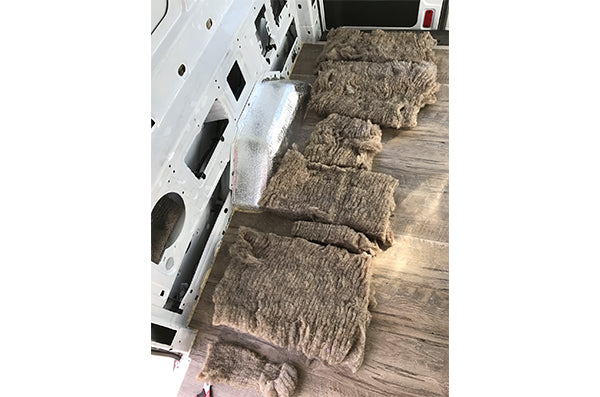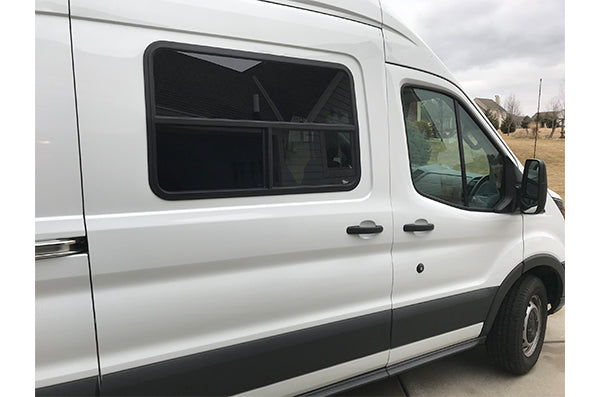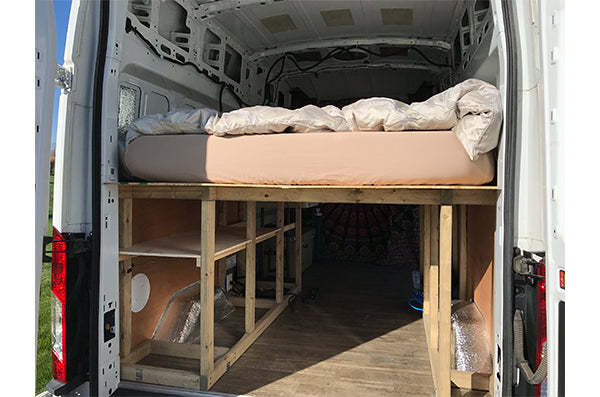The topic of insulation is widely debated across the blogs and forums on van conversions. The major factors of debate include efficiency, moisture management and cost. There are two major categories of insulation to choose from, spray or roll. We decided to begin weighing the options for roll insulation as we did not want to tackle the process and mess of applying the spray insulation. Before getting into the specifics, it is important to understand the concept of R value. R value is "the capacity of an insulating material to resist heat flow. The higher the R-value, the greater the insulating power." In order to fully insulate the Ford Transit 148 wheel base, we will need roughly 250 sq feet of insulations. After some initial research, we narrowed our options down to Thinsulate, denim or natural sheep's wool. We had excluded any fiberglass based insulation as we were nervous of any health risks associated with spending a lot of time in a small space with fiberglass particles floating around.
Thinsulate is a synthetic material with hydrophobic properties, meaning the fibers resist moisture, mold and mildew. Moisture management is an extremely important factor when evaluating insulation as you don't want mold and mildew to form behind the walls, ceiling and other finishes. The Thinsulate insulation comes in rolls of various sizes, but a standard of 1 3/4" thick at an R value of 5.2 for a cost of $2 / sq foot. Our overall feeling on Thinsulate was an expensive product for an average R value.
Next we began to investigate denim insulation. Denim is derived from recycled textiles (nice!) and is readily available at most home improvement stores. The R value is great at R13 for a 3.5" thick product and it costs as little as $.80 / sq ft. The one downside to denim insulation is that it naturally absorbs and holds moisture. In order to protect mold and mildew, you must cover any areas of insulation with a plastic vapor barrier. We did not want run the risk of the plastic wearing over time or getting a hole, so denim was scratched from our list.
The last option we explored was natural sheep's wool insulation. Sheep's wool insulation is naturally breathable and able to absorb, retain and release moisture without impacting insulating performance. Sheep's wool is also naturally flame retardant and will not disintegrate over time from vibration, which will happen to both fiberglass and denim. This wool insulation is rated at R13 for a 3.5" product and is priced at just about $2 / sq ft. Great moisture management, reasonable price and all natural...we were sold on the natural sheep's wool. We shopped around and found a USA sourced and made product at Eco Building Products. We wanted to make sure we weren't missing anything, so called Greg at Eco Building Products and he was incredible knowledgeable and helpful. We have been very happy with the insulation and glad we took the time to do our homework on this one! We will have a future post of installing the insulation coming shortly.




9 comments
Insulation North Shore
Visited this blog to know about the ford transit van conversaion for choosing insulation.I enjoyed rading this article. You would get the best review over here and would suggest others too. I like how you have researched and presented these exact points so clearly. Well, I have visited another site pilkingtoninsulation.co.nz having some wonderful and similar information.
Visited this blog to know about the ford transit van conversaion for choosing insulation.I enjoyed rading this article. You would get the best review over here and would suggest others too. I like how you have researched and presented these exact points so clearly. Well, I have visited another site pilkingtoninsulation.co.nz having some wonderful and similar information.
Larry McMahon
Shari,
The reason we stayed away from Rockwool was the potential for particles to loosen and get into the air from vibration of vehicle. I do not have any concrete proof that this would happen, but it seemed to be a common concern across most the articles and forums we found. Hope this helps!
Larry
Shari,
The reason we stayed away from Rockwool was the potential for particles to loosen and get into the air from vibration of vehicle. I do not have any concrete proof that this would happen, but it seemed to be a common concern across most the articles and forums we found. Hope this helps!
Larry
Shari
Would Rockwool insulation that Home Depot sales work for the walls and ceiling, along with in All the holes and crevices of the doors in my 2018 Ford Transit HR . Thank you.
Would Rockwool insulation that Home Depot sales work for the walls and ceiling, along with in All the holes and crevices of the doors in my 2018 Ford Transit HR . Thank you.
Roof Insulation Waikato
The major factors of Ford Transit van conversation include efficiency, moisture management and cost. This is superbly written. Good job! thanks. I have also found this resource Insultech.co.nz useful and its related to what you are mentioning.
The major factors of Ford Transit van conversation include efficiency, moisture management and cost. This is superbly written. Good job! thanks. I have also found this resource Insultech.co.nz useful and its related to what you are mentioning.
Larry
Susi,
Congrats on the van and thanks for the question! We used a foam board insulation on the floor. You can see the details on the blog post listed here: https://seekdrygoods.com/blogs/van-life/step-4-floor-installation. Let us know if you still have any questions.
Susi,
Congrats on the van and thanks for the question! We used a foam board insulation on the floor. You can see the details on the blog post listed here: https://seekdrygoods.com/blogs/van-life/step-4-floor-installation. Let us know if you still have any questions.
Susi Eggenberger
Hi,
Could you please tell me if you insulated the floor, as well with that 14 rolls? We bought a high top transit van (148"). I’m wondering if we’ll need more than 14 rolls? Any thoughts? Thanks so much! susi
Hi,
Could you please tell me if you insulated the floor, as well with that 14 rolls? We bought a high top transit van (148"). I’m wondering if we’ll need more than 14 rolls? Any thoughts? Thanks so much! susi
Larry McMahon
Sam,
We actually just finished completely insulating everything as our ceiling went up this weekend (exciting!!). All in we used 14 rolls of the insulation listed in the blog. This allowed coverage in all nooks and crannies as well as the big void behind the front cabin upper storage area. Let me know if you have any other questions.
Larry
Sam,
We actually just finished completely insulating everything as our ceiling went up this weekend (exciting!!). All in we used 14 rolls of the insulation listed in the blog. This allowed coverage in all nooks and crannies as well as the big void behind the front cabin upper storage area. Let me know if you have any other questions.
Larry
Sam
Would you tell me please how many rolls you used in your project. I think my Transit is the same as yours. Thanks
Would you tell me please how many rolls you used in your project. I think my Transit is the same as yours. Thanks
Randy Kirchhoff
I have a 2017 TRANSIT 350 extended length high roof turbo diesel. This page is AWESOME. Lots of great info for when I panel and insulate !
I have a 2017 TRANSIT 350 extended length high roof turbo diesel. This page is AWESOME. Lots of great info for when I panel and insulate !